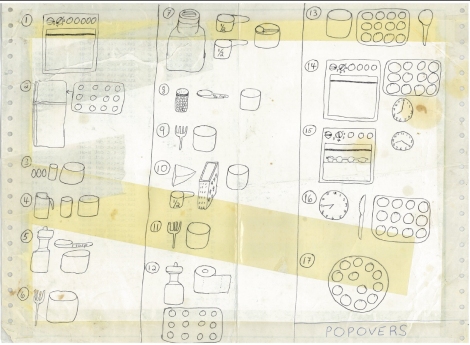[This article has been cross-posted to Musings of a Wandering Spirit.]
Recently, when clearing some bookshevles, my wife came across this illustrations-only set of instructions she’d prepared back in the late-90′s for our then pre-literate daughter, who’d demonstrated a propensity for (supervised, semi-independent) baking projects.
Having a fresh look at these instructions got me thinking about the use of comics and pictures-only documentation for non-literate and pre-literate users. In this case, the images are rather high-context, meaning, they might be meaningless to someone not familiar with the kitchen for which they were drawn, the equipment being used, and the end-product, in this case, popovers.
However, I can validate (or at least visually confirm) that these instructions—with a bit of practice—did in fact work. Our daughter, a pre-schooler at the time, indeed managed to create the intended product, based on following the image sequences in the drawings.
In the years since, I’ve come across a number of instances where a hardware vendor or app provider chose to rely mainly on illustrations, sometimes accompanied by text, other times relying only on pictures, in providing instructions for end-users.
Though I’ve yet to research the topic in-depth, I find the basic notion intriguing. That is, do we tend to be over-reliant on words, in cases where simple drawings would do the trick? Could we, as documentation specialists, make our instructional products more accessible to those who either have difficulty reading in general, or who aren’t familiar with the language(s) in which we provide wirtten documentation? Instead of—or more likely, in addition to—translating documentation into written languages, could we transform our instructions into comics or other illustrations-only media?
For what it’s worth, since I’m not a big fan of pudding-like baked goods, I’ve never actually tried the end-product. Nor am I a “foodie” or sharer of recipies (I tend to overlook such posts in Facebook and instantly delete them from email). Though if you decide to try applying these instructions at home, I’d be curious to hear about your outcome, as well as learn about your experiences with comic-based documentation.

